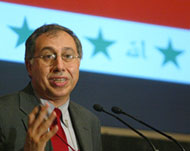Iraq constitution impasse continues
Negotiations on the wording of a draft constitution for Iraq have remained inconclusive, and talks will continue, the speaker of parliament Hajim al-Hassani said.

“Negotiations are still going on. Everybody was there,” he said on Thursday night. “This is a good sign and we hope we will reach a result tomorrow night.”
One senior negotiator from one of the government parties said, however, that he expected talks to continue beyond that, possibly until a meeting of parliament on Sunday.
Al-Hassani, asked if one more day was enough to reach a deal that would satisfy most parties, said: “I don’t know. I can’t tell. The constitution is a very important and sensitive issue.”
Saleh al-Mutlak, a senior negotiator for Sunni Arabs who have so far rejected a Shia-Kurdish proposal put to parliament on Monday, said he saw signs of flexibility.
Al-Hassani said there had been discussion at length on Thursday on the issues of federalism and deBaathification – the removal from public life of former supporters of Saddam Hussein.
Concern
Both of these issues have been of concern to some Sunni groups.
After a week’s delay, al-Hassani, as speaker, accepted a draft of the constitution on Monday, a deadline set by the US-sponsored interim law. However, he gave negotiators a further three days to work out compromises on particular issues.
Sunni leaders and some Shias have said they see little room to agree on the constitution as it stands, however.
 |
|
Laith Kubba’s claims have been |
Government officials have rejected talk of legal challenges from some Sunni groups over the failure to complete negotiations by the 22 August constitutional deadline.
The officials say that the interim law says only that “parliament shall write the draft” by that date but that it does not mean there can be no subsequent changes. Nor does it stipulate a parliamentary vote on the issue.
Sunnis, who have remained fiercely opposed to the charter as it stands now, say it could lead to civil war.
“(Government spokesman) Laith Kubba has been saying that we solved the disputes for a month now, but so far we have not gotten anywhere,” Hussein al-Falluja, a Sunni member of the constitution panel.
“If this constitution continues to include federalism it should be put in the bin and done again.”